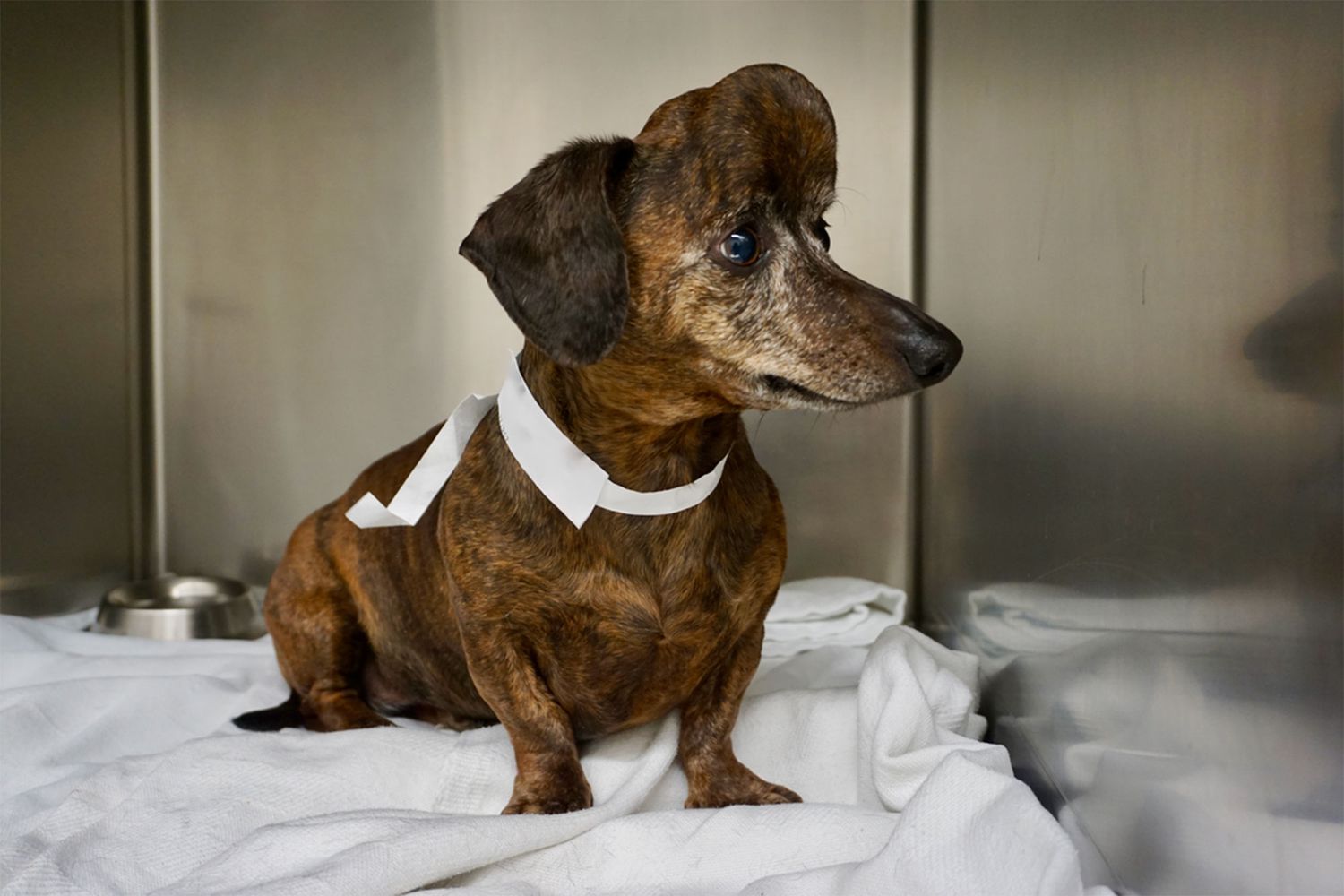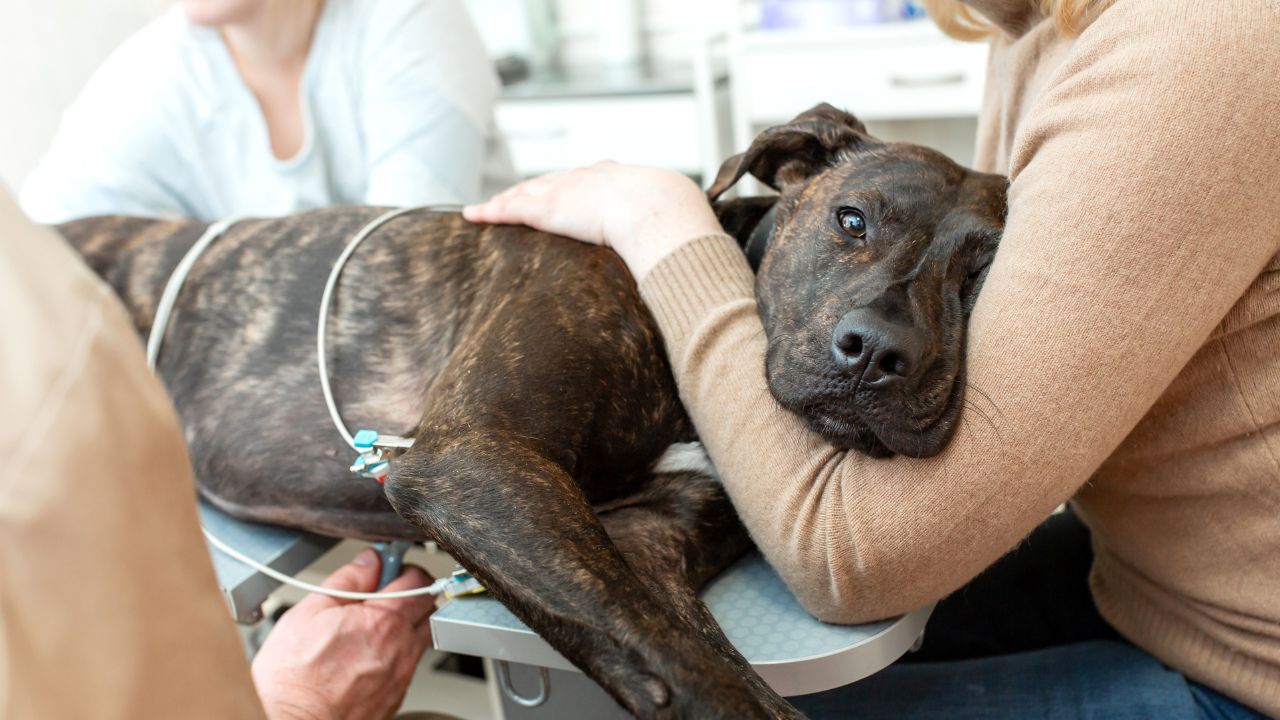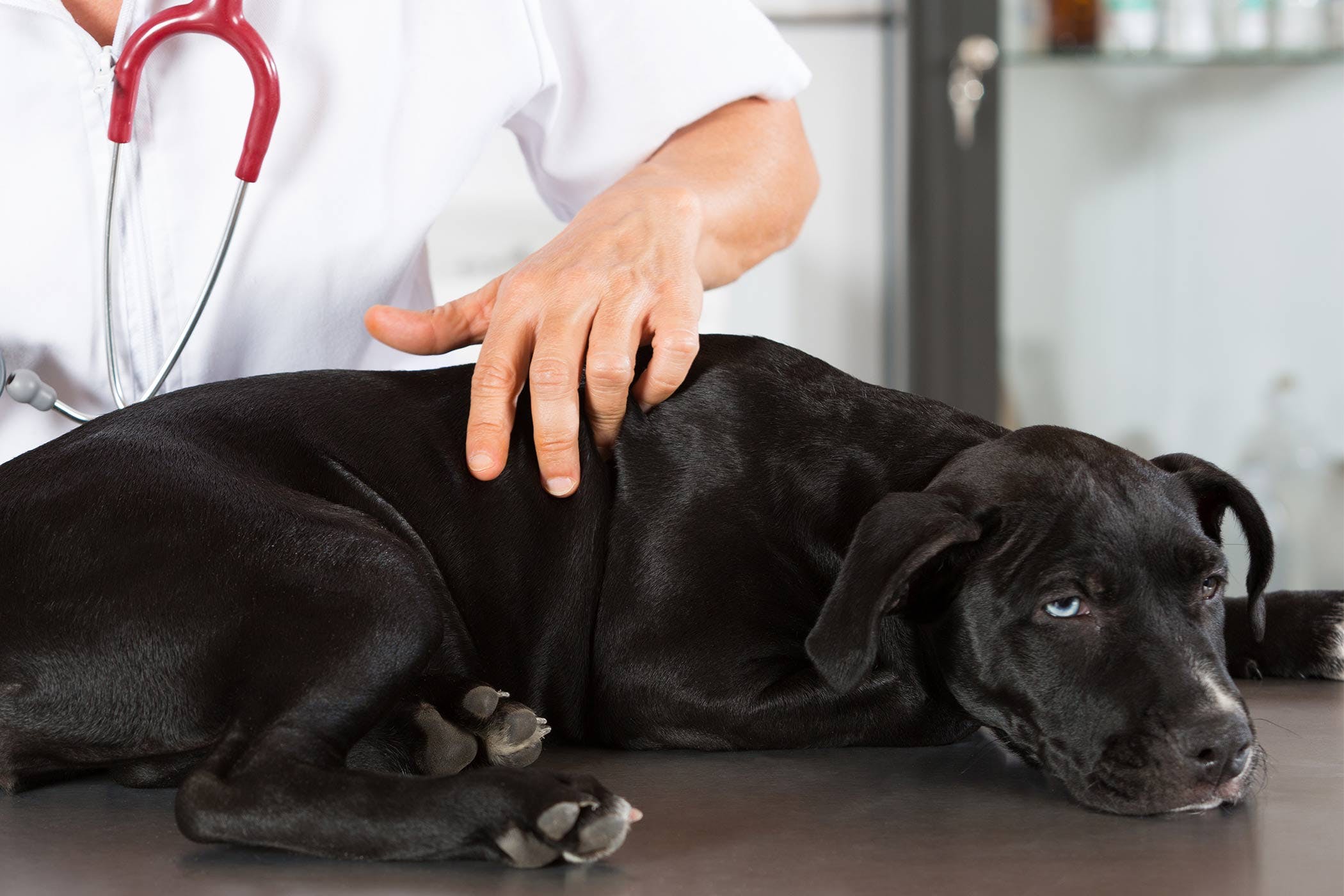Home>Health & Wellness>Common Health Issues>What Are Common Dog Breeds That Get Cancer


Common Health Issues
What Are Common Dog Breeds That Get Cancer
Published: February 4, 2024
Learn about common dog breeds that are prone to cancer and how to identify and manage this common health issue. Understand the risks and take steps to protect your furry friend.
(Many of the links in this article redirect to a specific reviewed product. Your purchase of these products through affiliate links helps to generate commission for Pawsomeoldies.com, at no extra cost. Learn more)
Table of Contents
Introduction
Cancer is a devastating disease that affects not only humans but also our beloved canine companions. Just like humans, dogs can also develop various types of cancer, which can significantly impact their quality of life. While any dog breed can potentially develop cancer, certain breeds are more predisposed to specific types of cancer due to genetic factors, environmental influences, and other underlying reasons.
Understanding the common dog breeds that are prone to cancer is crucial for early detection, proactive monitoring, and preventive measures. By recognizing the predispositions of certain breeds, dog owners and veterinarians can take proactive steps to monitor their pets' health and potentially detect cancer at its early stages, improving the chances of successful treatment and a better prognosis.
In this article, we will explore some of the most common dog breeds that are known to have a higher risk of developing cancer. By shedding light on these breeds, we aim to raise awareness about the importance of regular veterinary check-ups, early detection, and proactive healthcare measures to safeguard the well-being of our furry friends. Let's delve into the unique characteristics of each breed and the specific types of cancer they are more susceptible to.
Labrador Retriever
Labrador Retrievers, often referred to as Labs, are one of the most popular dog breeds globally, known for their friendly demeanor, intelligence, and loyalty. While they are beloved family pets and reliable working dogs, they are also unfortunately predisposed to certain health issues, including cancer.
One of the most prevalent types of cancer seen in Labrador Retrievers is mast cell tumors. Mast cells are a type of white blood cell involved in the body's allergic responses. When these cells become abnormal and start to multiply uncontrollably, they form tumors that can be malignant. Mast cell tumors can occur in various parts of the body, including the skin, spleen, and gastrointestinal tract.
Additionally, Labrador Retrievers are also prone to developing lymphoma, a type of cancer that affects the lymphatic system. Lymphoma can manifest in the lymph nodes, spleen, liver, and other organs, leading to symptoms such as swollen lymph nodes, lethargy, and weight loss.
The breed's susceptibility to cancer can be attributed to genetic predispositions, environmental factors, and the breed's overall health. Due to their genetic makeup, Labs may be more vulnerable to certain types of cancer, necessitating regular veterinary check-ups and proactive monitoring for early detection.
As responsible pet owners, it is crucial to be vigilant for any unusual lumps, bumps, or changes in behavior in Labrador Retrievers. Early detection of cancer can significantly improve the chances of successful treatment and a better prognosis for our beloved furry companions.
By staying informed about the health predispositions of Labrador Retrievers, pet owners can work closely with veterinarians to develop tailored healthcare plans that include regular screenings, a balanced diet, and a healthy lifestyle to mitigate the risk of cancer and other health concerns in these wonderful dogs.
Golden Retriever
Golden Retrievers are renowned for their friendly and gentle nature, making them one of the most beloved and popular dog breeds worldwide. However, along with their amiable disposition, they are also predisposed to certain health issues, including cancer. Understanding the specific cancer risks associated with Golden Retrievers is crucial for proactive healthcare and early detection.
One of the most prevalent types of cancer seen in Golden Retrievers is hemangiosarcoma. This aggressive cancer originates in the blood vessels and commonly affects the spleen, heart, and liver. Due to its insidious nature, hemangiosarcoma can often remain undetected until it reaches an advanced stage, making early detection and intervention challenging.
Additionally, Golden Retrievers are also prone to developing lymphoma, a cancer of the lymphatic system. Lymphoma can manifest in various organs, leading to symptoms such as swollen lymph nodes, lethargy, and loss of appetite. The breed's susceptibility to lymphoma underscores the importance of regular veterinary check-ups and proactive monitoring to detect this condition in its early stages.
Moreover, Golden Retrievers have a higher predisposition to developing mast cell tumors, which are abnormal growths in the skin that can be malignant. These tumors can vary in size and may appear as lumps or bumps on the dog's skin. Due to the potential for these tumors to be malignant, prompt veterinary evaluation and potential surgical removal are essential for the well-being of Golden Retrievers.
The breed's genetic predispositions, environmental factors, and overall health contribute to their susceptibility to cancer. As responsible pet owners, it is imperative to be vigilant for any signs of illness, changes in behavior, or abnormal physical symptoms in Golden Retrievers. Early detection of cancer through regular veterinary screenings and proactive healthcare measures can significantly improve the chances of successful treatment and a better prognosis for these beloved companions.
By staying informed about the health predispositions of Golden Retrievers, pet owners can collaborate with veterinarians to develop tailored healthcare plans that include regular screenings, a balanced diet, and a healthy lifestyle to mitigate the risk of cancer and other health concerns in these wonderful dogs.
Boxer
Boxers are well-known for their playful and energetic nature, endearing themselves to families as loyal and affectionate companions. However, amidst their exuberant personalities, Boxers are predisposed to certain health concerns, including a heightened risk of developing cancer. Understanding the specific cancer vulnerabilities associated with Boxers is essential for proactive healthcare and early detection.
One of the most prevalent types of cancer seen in Boxers is mast cell tumors. These tumors originate from mast cells, which are part of the immune system and play a role in allergic responses. When these cells become abnormal and multiply uncontrollably, they form tumors that can be malignant. Mast cell tumors in Boxers often manifest on the skin, and while some may be benign, others can be aggressive and require prompt veterinary attention.
Additionally, Boxers are prone to developing lymphoma, a cancer that affects the lymphatic system. Lymphoma can manifest in various organs, leading to symptoms such as swollen lymph nodes, lethargy, and loss of appetite. The breed's susceptibility to lymphoma underscores the importance of regular veterinary check-ups and proactive monitoring to detect this condition in its early stages.
Furthermore, Boxers have a higher predisposition to developing brain tumors, particularly gliomas. These tumors can affect the brain and spinal cord, leading to neurological symptoms such as seizures, disorientation, and changes in behavior. Due to the potential severity of brain tumors, early detection through vigilant observation and prompt veterinary evaluation is crucial for the well-being of Boxers.
The breed's genetic predispositions, environmental factors, and overall health contribute to their susceptibility to cancer. As responsible pet owners, it is imperative to be vigilant for any signs of illness, changes in behavior, or abnormal physical symptoms in Boxers. Early detection of cancer through regular veterinary screenings and proactive healthcare measures can significantly improve the chances of successful treatment and a better prognosis for these beloved companions.
By staying informed about the health predispositions of Boxers, pet owners can collaborate with veterinarians to develop tailored healthcare plans that include regular screenings, a balanced diet, and a healthy lifestyle to mitigate the risk of cancer and other health concerns in these wonderful dogs.
German Shepherd
German Shepherds are renowned for their intelligence, loyalty, and versatility, serving as exceptional working dogs, family companions, and service animals. However, amidst their remarkable capabilities, German Shepherds are predisposed to certain health concerns, including a heightened risk of developing cancer. Understanding the specific cancer vulnerabilities associated with German Shepherds is essential for proactive healthcare and early detection.
One of the most prevalent types of cancer seen in German Shepherds is hemangiosarcoma. This aggressive cancer originates in the blood vessels and commonly affects the spleen, heart, and liver. Due to its insidious nature, hemangiosarcoma can often remain undetected until it reaches an advanced stage, making early detection and intervention challenging. The breed's susceptibility to hemangiosarcoma underscores the importance of regular veterinary check-ups and proactive monitoring to detect this condition in its early stages.
Additionally, German Shepherds are also prone to developing osteosarcoma, a type of bone cancer that commonly affects the limbs. Osteosarcoma is known for its rapid progression and can cause lameness, swelling, and intense pain in affected limbs. The breed's predisposition to osteosarcoma highlights the significance of vigilant observation for any signs of discomfort or mobility issues, prompting timely veterinary evaluation and potential diagnostic imaging.
Moreover, German Shepherds have a higher susceptibility to developing hemangiosarcoma, a cancer that affects the connective tissues, particularly in the spleen and heart. Hemangiosarcoma can manifest with symptoms such as weakness, pale gums, and abdominal distension, necessitating immediate veterinary attention. The breed's genetic predispositions, environmental factors, and overall health contribute to their susceptibility to cancer.
As responsible pet owners, it is imperative to be vigilant for any signs of illness, changes in behavior, or abnormal physical symptoms in German Shepherds. Early detection of cancer through regular veterinary screenings and proactive healthcare measures can significantly improve the chances of successful treatment and a better prognosis for these beloved companions.
By staying informed about the health predispositions of German Shepherds, pet owners can collaborate with veterinarians to develop tailored healthcare plans that include regular screenings, a balanced diet, and a healthy lifestyle to mitigate the risk of cancer and other health concerns in these remarkable dogs.
Read more: What Happens When Dogs Get Cancer
Bernese Mountain Dog
Bernese Mountain Dogs, with their striking tri-colored coats and gentle dispositions, are beloved for their affectionate nature and loyalty. However, amidst their endearing qualities, Bernese Mountain Dogs are predisposed to certain health concerns, including a heightened risk of developing cancer. Understanding the specific cancer vulnerabilities associated with Bernese Mountain Dogs is essential for proactive healthcare and early detection.
One of the most prevalent types of cancer seen in Bernese Mountain Dogs is histiocytic sarcoma. This aggressive cancer originates in the histiocytes, which are cells involved in the immune system's response to inflammation. Histiocytic sarcoma can affect various organs, including the spleen, lungs, and bones, leading to symptoms such as lethargy, difficulty breathing, and lameness. The breed's susceptibility to histiocytic sarcoma underscores the importance of regular veterinary check-ups and proactive monitoring to detect this condition in its early stages.
Additionally, Bernese Mountain Dogs are prone to developing mast cell tumors, which are abnormal growths in the skin that can be malignant. These tumors can vary in size and may appear as lumps or bumps on the dog's skin. Due to the potential for these tumors to be aggressive, prompt veterinary evaluation and potential surgical removal are essential for the well-being of Bernese Mountain Dogs.
Moreover, Bernese Mountain Dogs have a higher predisposition to developing lymphoma, a cancer that affects the lymphatic system. Lymphoma can manifest in various organs, leading to symptoms such as swollen lymph nodes, lethargy, and loss of appetite. The breed's genetic predispositions, environmental factors, and overall health contribute to their susceptibility to cancer.
As responsible pet owners, it is imperative to be vigilant for any signs of illness, changes in behavior, or abnormal physical symptoms in Bernese Mountain Dogs. Early detection of cancer through regular veterinary screenings and proactive healthcare measures can significantly improve the chances of successful treatment and a better prognosis for these beloved companions.
By staying informed about the health predispositions of Bernese Mountain Dogs, pet owners can collaborate with veterinarians to develop tailored healthcare plans that include regular screenings, a balanced diet, and a healthy lifestyle to mitigate the risk of cancer and other health concerns in these wonderful dogs.
Rottweiler
Rottweilers, known for their strength, loyalty, and protective instincts, are a robust and versatile breed with a rich history of serving as working dogs and devoted companions. Despite their remarkable attributes, Rottweilers are predisposed to certain health concerns, including a heightened risk of developing cancer. Understanding the specific cancer vulnerabilities associated with Rottweilers is essential for proactive healthcare and early detection.
One of the most prevalent types of cancer seen in Rottweilers is osteosarcoma, a highly aggressive and painful bone cancer that commonly affects the limbs. Rottweilers are particularly susceptible to this condition, and it often manifests with symptoms such as lameness, swelling, and acute discomfort. Due to the rapid progression of osteosarcoma, early detection through vigilant observation for any signs of mobility issues and prompt veterinary evaluation is crucial for the well-being of Rottweilers.
Additionally, Rottweilers are prone to developing lymphoma, a cancer that affects the lymphatic system. Lymphoma can manifest in various organs, leading to symptoms such as swollen lymph nodes, lethargy, and loss of appetite. The breed's predisposition to lymphoma underscores the significance of regular veterinary check-ups and proactive monitoring to detect this condition in its early stages, enhancing the prospects for successful treatment and improved outcomes.
Moreover, Rottweilers have a higher susceptibility to developing hemangiosarcoma, a cancer that originates in the blood vessels and commonly affects the spleen, heart, and liver. Hemangiosarcoma is known for its insidious nature, often remaining asymptomatic until reaching an advanced stage. Therefore, regular veterinary screenings and proactive healthcare measures are essential for early detection and intervention, potentially improving the prognosis for Rottweilers affected by this aggressive cancer.
The breed's genetic predispositions, environmental factors, and overall health contribute to their susceptibility to cancer. As responsible pet owners, it is imperative to be vigilant for any signs of illness, changes in behavior, or abnormal physical symptoms in Rottweilers. Early detection of cancer through regular veterinary screenings and proactive healthcare measures can significantly improve the chances of successful treatment and a better prognosis for these beloved companions.
By staying informed about the health predispositions of Rottweilers, pet owners can collaborate with veterinarians to develop tailored healthcare plans that include regular screenings, a balanced diet, and a healthy lifestyle to mitigate the risk of cancer and other health concerns in these remarkable dogs.
Beagle
Beagles, with their endearing expression and merry disposition, have captured the hearts of dog lovers around the world. However, amidst their playful and affectionate nature, Beagles are predisposed to certain health concerns, including a heightened risk of developing cancer. Understanding the specific cancer vulnerabilities associated with Beagles is essential for proactive healthcare and early detection.
One of the most prevalent types of cancer seen in Beagles is transitional cell carcinoma (TCC), a malignant tumor that commonly affects the urinary bladder. TCC can lead to symptoms such as blood in the urine, increased frequency of urination, and straining during urination. The breed's susceptibility to TCC underscores the importance of regular veterinary check-ups and proactive monitoring to detect this condition in its early stages, facilitating timely intervention and potential treatment options.
Additionally, Beagles are prone to developing mast cell tumors, which are abnormal growths in the skin that can be malignant. These tumors can vary in size and may appear as lumps or bumps on the dog's skin. Due to the potential for these tumors to be aggressive, prompt veterinary evaluation and potential surgical removal are essential for the well-being of Beagles.
Moreover, Beagles have a higher predisposition to developing lymphoma, a cancer that affects the lymphatic system. Lymphoma can manifest in various organs, leading to symptoms such as swollen lymph nodes, lethargy, and loss of appetite. The breed's genetic predispositions, environmental factors, and overall health contribute to their susceptibility to cancer.
As responsible pet owners, it is imperative to be vigilant for any signs of illness, changes in behavior, or abnormal physical symptoms in Beagles. Early detection of cancer through regular veterinary screenings and proactive healthcare measures can significantly improve the chances of successful treatment and a better prognosis for these beloved companions.
By staying informed about the health predispositions of Beagles, pet owners can collaborate with veterinarians to develop tailored healthcare plans that include regular screenings, a balanced diet, and a healthy lifestyle to mitigate the risk of cancer and other health concerns in these wonderful dogs.
Scottish Terrier
Scottish Terriers, affectionately known as "Scotties," are iconic for their distinctive appearance, characterized by their compact, sturdy build and a dignified, independent demeanor. While these beloved companions bring joy and loyalty to countless households, they are also predisposed to certain health concerns, including a heightened risk of developing cancer. Understanding the specific cancer vulnerabilities associated with Scottish Terriers is crucial for proactive healthcare and early detection, ultimately contributing to the well-being of these remarkable dogs.
One of the most prevalent types of cancer seen in Scottish Terriers is bladder cancer, particularly transitional cell carcinoma (TCC). This malignant tumor affects the urinary bladder and can lead to symptoms such as blood in the urine, increased frequency of urination, and discomfort during urination. The breed's susceptibility to TCC underscores the importance of regular veterinary check-ups and proactive monitoring to detect this condition in its early stages, facilitating timely intervention and potential treatment options.
Additionally, Scottish Terriers are prone to developing mast cell tumors, which are abnormal growths in the skin that can be malignant. These tumors can vary in size and may appear as lumps or bumps on the dog's skin. Due to the potential for these tumors to be aggressive, prompt veterinary evaluation and potential surgical removal are essential for the well-being of Scottish Terriers.
Moreover, Scottish Terriers have a higher predisposition to developing lymphoma, a cancer that affects the lymphatic system. Lymphoma can manifest in various organs, leading to symptoms such as swollen lymph nodes, lethargy, and loss of appetite. The breed's genetic predispositions, environmental factors, and overall health contribute to their susceptibility to cancer.
As responsible pet owners, it is imperative to be vigilant for any signs of illness, changes in behavior, or abnormal physical symptoms in Scottish Terriers. Early detection of cancer through regular veterinary screenings and proactive healthcare measures can significantly improve the chances of successful treatment and a better prognosis for these beloved companions.
By staying informed about the health predispositions of Scottish Terriers, pet owners can collaborate with veterinarians to develop tailored healthcare plans that include regular screenings, a balanced diet, and a healthy lifestyle to mitigate the risk of cancer and other health concerns in these wonderful dogs.
Read more: How Do Dogs Get Bladder Cancer
Basset Hound
Basset Hounds, with their endearing droopy ears and soulful eyes, embody a distinctive charm that has captivated dog enthusiasts for generations. Despite their lovable and laid-back nature, Basset Hounds are predisposed to certain health concerns, including a heightened risk of developing cancer. Understanding the specific cancer vulnerabilities associated with Basset Hounds is essential for proactive healthcare and early detection, ultimately contributing to the well-being of these beloved companions.
One of the most prevalent types of cancer seen in Basset Hounds is lymphoma, a cancer that affects the lymphatic system. Lymphoma can manifest in various organs, leading to symptoms such as swollen lymph nodes, lethargy, and loss of appetite. The breed's genetic predispositions, environmental factors, and overall health contribute to their susceptibility to cancer. As responsible pet owners, it is imperative to be vigilant for any signs of illness, changes in behavior, or abnormal physical symptoms in Basset Hounds. Early detection of cancer through regular veterinary screenings and proactive healthcare measures can significantly improve the chances of successful treatment and a better prognosis for these beloved companions.
Additionally, Basset Hounds are prone to developing mast cell tumors, which are abnormal growths in the skin that can be malignant. These tumors can vary in size and may appear as lumps or bumps on the dog's skin. Due to the potential for these tumors to be aggressive, prompt veterinary evaluation and potential surgical removal are essential for the well-being of Basset Hounds.
Moreover, Basset Hounds have a higher predisposition to developing hemangiosarcoma, a cancer that originates in the blood vessels and commonly affects the spleen, heart, and liver. Hemangiosarcoma is known for its insidious nature, often remaining asymptomatic until reaching an advanced stage. Therefore, regular veterinary screenings and proactive healthcare measures are essential for early detection and intervention, potentially improving the prognosis for Basset Hounds affected by this aggressive cancer.
By staying informed about the health predispositions of Basset Hounds, pet owners can collaborate with veterinarians to develop tailored healthcare plans that include regular screenings, a balanced diet, and a healthy lifestyle to mitigate the risk of cancer and other health concerns in these wonderful dogs.
Conclusion
In conclusion, it is evident that certain dog breeds are predisposed to a higher risk of developing cancer, highlighting the importance of proactive healthcare, early detection, and informed vigilance by pet owners and veterinarians. The unique genetic predispositions, environmental influences, and overall health characteristics of specific breeds contribute to their susceptibility to various types of cancer, necessitating tailored healthcare approaches to safeguard their well-being.
By shedding light on the common dog breeds that are more prone to cancer, this awareness serves as a catalyst for proactive measures, including regular veterinary check-ups, vigilant observation for any signs of illness or abnormal symptoms, and the implementation of tailored healthcare plans. Early detection of cancer through routine screenings and prompt veterinary intervention can significantly improve the prospects for successful treatment and a better prognosis for our beloved canine companions.
Furthermore, the collaboration between pet owners and veterinarians is paramount in developing comprehensive healthcare strategies that encompass regular screenings, a balanced diet, and a healthy lifestyle to mitigate the risk of cancer and other health concerns in predisposed breeds. This collaborative approach empowers pet owners to actively participate in their dogs' well-being, fostering a proactive and attentive environment that prioritizes early detection and preventive care.
As we navigate the complexities of canine health, it is essential to recognize that each dog, regardless of breed, is a unique individual with distinct healthcare needs. While certain breeds may have a higher predisposition to specific types of cancer, every dog deserves personalized attention, compassionate care, and a commitment to proactive health management.
Ultimately, by staying informed about the health vulnerabilities of specific dog breeds and embracing a collaborative approach to healthcare, we can strive to enhance the well-being of our furry companions, celebrate their unique qualities, and provide them with the best possible quality of life. Through knowledge, vigilance, and proactive healthcare, we can work towards mitigating the impact of cancer and other health challenges, nurturing the enduring bond between humans and their canine counterparts.













